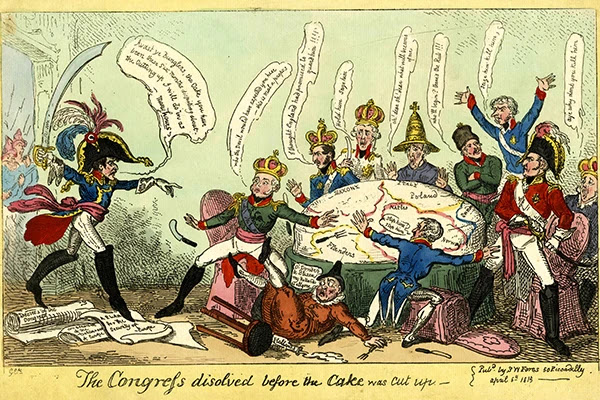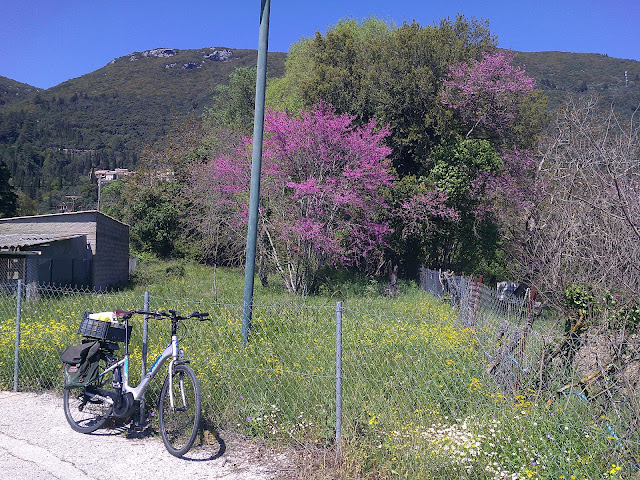For once during this greyest of Mays the sky's cloudless, blue as eyes but for a small cloud the size of a man's hand over a southern mountain. My bicycle is loaded with onions, a box of village rosé, a loaf, firestarters, dried sausage and a role of black plastic sacks. The countryside is jocund. The verges of roads and gravel tracks are dense with yellow, blue, pink, and red flowers. The kokkuyia trees are blushing with guilt. Easter's over. Kristos Anesti. Lin said "I also need garlic and parsley" but only when I'd got home after bouncing the bicycle down 13 steps to the house. I have a cup of tea then go out again, up the steps helped by the e-bike's 'walk' gear, and back to the mainroad - 2 kilometres - then westward towards Skripero to the nearest grocer. I've looked up 'parsley' - maidones. They have it. Good. The breeze even in early afternoon is still cold.
June - the descent from Democracy Street is like taking off. First there's an ascent of 50 metres, then round a corner my wheels bump over the messy repaired surface of a winding hill into three hairpin bends past a frieze of scarlet bougainvillea climbing widow Melinda's house, then down on renewed tarmac, gathering speed until the wheelie bin T-junction where I prop my bicycle on its stand to unload a black sack of weekly waste and the remains of a large broken plastic laundry bowl, then down again past greenery on either side to another short ascent. At the top I turn right on a narrow concrete track, corrugated, like turbulence on a plane, past a hoard of rubbish with glimpses of isolated houses and rich meadows of uncut grass and flowers, to another metalled road allowing me to join the main road to the north of the island via Skripero, Trompetta and Agros.
*** *** ***
I'm working into my third reading of Mark Mazower's book on the Greek Revolution, as well as dipping into pages and chapters and the index. This is an incomplete, as Mazower admits, and contested history.
 |
| Marietta Giannakou 1951-2022 |
Prof Mazower's book describes truths that were once politically unacceptable in Greece. In 2021, Mazower was awarded an honorary Greek citizenship by a Conservative government for 'the promotion of Greece, its long history and culture to the international general public.'
I asked a Greek friend recently "Do you call the events that brought about modern Greece 'The Greek War of Independence' or 'The Greek Revolution'?"
Alex reflected for a moment on the direction of my query and answered, indisputably, "'The Greek Revolution' "
Mark Mazower titles his history 'The Greek Revolution', but unfolds a more equivocal account. This comes much later, but it's clear that the allied Navies that defeated the Turks and the Egyptians at Navarino in 1827 would not have fought to save a 'revolution'. Mazower's book has managed to come, as near as a work of historical scholarship can, to being a 'cliff-hanger'. Of course, the Greeks were victorious. The Hellenic Republic exists. It's on the euro-currency! But reading Mazower's history I was wondering to his last chapter who was going to win.
Insurrectionary talk was widespread across Europe in the 1820s. Rebellion against the old orders had been sparked by the American War of Independence; then the French Revolution and revolts across South America and the other parts of Europe. Metternich and the Tsar had convened the Congress of Vienna - nearly wrecked by Napoleon's escape from Elba and his 100 days...
 |
| Napoleon returns from Elba to disrupt the Congress of Vienna (George Cruikshank) |
 |
| The Congress organised by Metternich was dominated by Austria, France, Prussia, Russia, and Britain. |
 |
| Prince Alexandros Ypsilanti |
Trade is a good cover for subversion; the language of commerce camouflaging the planning of revolt - price lists, inventories, consignments, cargoes, weights and measures, transactions, deadlines - protected by normal business discretion. In 1820 the leaders of Filiki Etaireia asked Prince Alexander Ypsilanti to be their leader. Given the omens - not least the profound opposition of Ioannis Capodistria, to become first Prime Minister of Greece (more of him later), this aristocratic soldier was probably an excellent choice to start a dangerously impossible rebellion.
On 21st February this impulsive, bold, one-armed veteran of the war against Napoleon, falsely claiming the support of the Tzar, led a small and ragged force across the river Pruth from Russia into Ottoman Moldavia, far north of the land that would become Greece. Ypsilanti's expedition turned into a debacle of confusion and desertion, and, as others more cautious had warned, provoked bloody reprisals against Greeks from Sultan Mahmud II in Constantinople. The most prominent was the public hanging of the Ecumenical Patriarch, Gregory V, in front of The Saint Peter's Gate of the Patriarchate of Constantinople just after he'd celebrated Easter mass.
 |
| Easter Sunday 22 April 1821 |
With implicit approval of the Sultan, surrounding streets ran with the blood of Christian residents of the city. If this story were a Netflix series I'd end this first episode at this moment. The next episode would be about Greece in the early 19th century opening on a dramatic panorama of mountainous stone with glimpses of distant blue sea "Rumeli - mainland Greece 15 years earlier" and perhaps we'd open at the court of the rebel potentate Ali Pasha in Jannina.
;_lithograph_by_George_de_la_Poer_Beresford.jpeg) |
| Audience chamber at the court of Ali Pasha in Jannina |



No comments:
Post a Comment